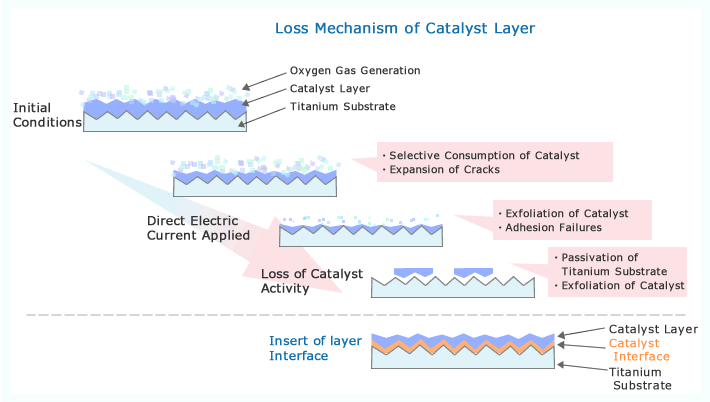- HOME >
- Service >
- Electrode Services >
- Anode for Oxygen Gas Generation
Anode for Oxygen Gas Generation
Anode for Oxygen Gas Generation
(excellent performance even under severe operating conditions )
The anode for oxygen gas generation is fitted for a wide range of electrolysis processes, such as, those for steel strip plating, copper foil, metal surface treatment, electrowinning, electric dialysis, electrodeposition coating and waste liquid treatment. Iridium oxide is used as the catalyst of the anode. This anode shows higher durability than other anodes, such as, platinum-plated titanium electrodes, graphite electrodes, soluble electrodes and lead alloy electrode, and has a longer life. NEOLORD™ is low in oxygen gas generation overvoltage and in power consumption.
Features
Electrode for Electrogalvanizing (fitted for high current density electroplating)
Generally speaking, in case of continuous operations of an electrolysis plant, the electrode's performance is to affected for oxygen gas generation on the anode as a result of the loss of the catalyst and damages occurring between the anode substrate and catalyst interface. The catalyst loss increases when the electric current for electrolysis and the temperature of the electrolysis environment increase.
The anode loses its catalyst activities due to the deterioration of the connection between the anode substrate and catalyst interface. As shown in the figure below, catalyst loss and cracks develop from years of use. In such cases, the electrolyte migrates to the surface of the titanium substrate, which curtails catalyst activities and creates for adhesion failures and passivation of its surface.
However, Daiso Engineering's technologies have developed an anode with higher durability than ever under more than 100 A/dm2 operation conditions by inserting a material with corrosion resistance as an interface layer between the anode substrate and catalyst interfaces.
As a result, this anode has gained steady usage among plant operators in Japan and abroad, particularly in the electrolytic galvanizing line (EGL) field.

Electrode for electric tinning (organic material resistance, sludge generation control type)
Daiso Engineering's anode can control the decomposition of organic materials in the electrolysis solution to reduce sludge generation from such decomposition. This anode reduces the generation of the sludge and lasts longer, particularly in an electric tinning line plant, irrespective of whether PSA or MSA baths are used.
* Phenolsulfonic Acid Bath: PSA, Metanesulfonic Acid Bath: MSA
Electrode for Electrolyte Copper Foil (manufactured in full compliance with the user's required specifications and substrate forms)
In an electrolytic copper-foil manufacturing plant, uniformity of the produced copper foil is rigidly required for the manufacturing facilities as well as the post-treatment facilities at the time of manufacturing. However, such requirements have been attained only with the advanced technologies of the electrolyzers and the anodes used therein. Daiso Engineering is very proud of its long experience in manufacturing long-lasting anodes of its own design in addition to those of various shapes designed by companies.
| Use | Electrode Type | ||
|---|---|---|---|
| Anode for Oxygen Gas Generation |
Various Plating of Metals such as Zinc, Tin, Copper, Gold, and Nickel |
For low- and mid-current density | MD-100, MD-150, MD-160, K5000 |
| For high-current density |
MD-200 | ||
| For cathode polarization endurance | MD-300 | ||
| For organic resistance | MD-100S | ||







